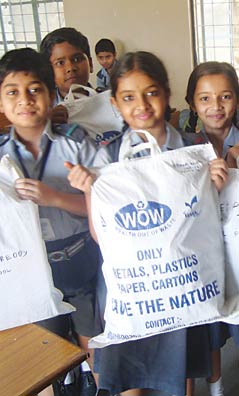Towards 100% Recycling
Creating Wealth Out of Waste (WOW)
 ITC’s WOW – ‘Wealth Out of Waste’ programme has been instrumental in creating awareness amongst the public on the benefits of the Reduce-Reuse-Recycle approach. The waste recycling initiatives implemented by the programme have contributed significantly to the protection of the environment, as well as in improving civic amenities, public health and hygiene. This initiative has received several accolades from the Government, NGOs, commercial institutions and the public at large including the prestigious Papyrus Award by the Bureau of International Recycling (BIR). ITC’s WOW – ‘Wealth Out of Waste’ programme has been instrumental in creating awareness amongst the public on the benefits of the Reduce-Reuse-Recycle approach. The waste recycling initiatives implemented by the programme have contributed significantly to the protection of the environment, as well as in improving civic amenities, public health and hygiene. This initiative has received several accolades from the Government, NGOs, commercial institutions and the public at large including the prestigious Papyrus Award by the Bureau of International Recycling (BIR).
ITC benefits from the generation of sustainable raw material sources at competitive prices, while also conserving our precious natural resources and creating sustainable livelihoods.
The initiative has helped create awareness amongst consumers on the benefits of segregation of waste like paper, plastic and metals.
Segregated dry waste can save almost 40% of municipal garbage handling costs, thereby releasing resources for improvement of other civic amenities.
What started in a small way with households has now spread to schools, government offices, corporates and other institutions. The WOW initiative commenced with an average monthly collection of 100 MT in 2007 and has now spread across South India with an average monthly collection of 3000 MT. |
| |
2007-08 |
2008-09 |
2009-10 |
2010-11 |
| Total waste
(tonnes) |
352,970 |
490,180 |
578,865 |
638,405 |
| Waste recycled
(tonnes) |
349,264 |
484,287 |
577,766 |
637,452 |
| % Recycled |
98.9% |
98.8% |
99.8% |
99.8% |
| Un-recycled
waste (tonnes) |
3706 |
5893 |
1099 |
953 |
| External
wastes
used as raw
materials
(tonnes) |
163,245 |
125,337 |
125,931 |
119,002 |
| Waste recycling
footprint (%)* |
145 |
124 |
122 |
119 |
* Waste Recycling footprint (%): (Waste recycled + external waste
used as raw material) X 100 / Total waste generated in ITC |
In line with our commitment to consolidate our waste recycling positive status, many of our Units, are already progressing towards zero waste discharge.
Cigarette factories at Bengaluru, Saharanpur, Kolkata and Pune, Leaf Threshing units at Anaparti, Paperboards and Specialty Papers Units at Kovai and Tribeni, Personal Care Business Unit at Haridwar, Foods Business Unit at Pune, the ITC Green Centre at Gurgaon, Surya Nepal’s Cigarette factory at Simra and Hotels – ITC Maurya, ITC Maratha, ITC Grand Central, ITC Windsor, ITC Mughal, ITC Sonar, ITC Gardenia, ITC Kakatiya, and WelcomHotel Sheraton Chola, WelcomHotel Sheraton New Delhi & WelcomHotel Sheraton Rajputana reused/ recycled entire wastes (more than 99%) generated out of their operations.
Wastes used as Raw Materials
| ITC – Solid Waste Recycling Positive – 4 Years in a Row. |
Our Kovai Paperboards Unit, continued to use post-consumer wastepaper for the entire production and our Bhadrachalam Unit also utilised 23,664 tonnes of postconsumer waste paper as raw material.
ITC not only recycled almost all the solid waste generated by its Units, but also procured and recycled 1,19,002 tonnes of waste paper this year, resulting in yet another positive environmental footprint. |

